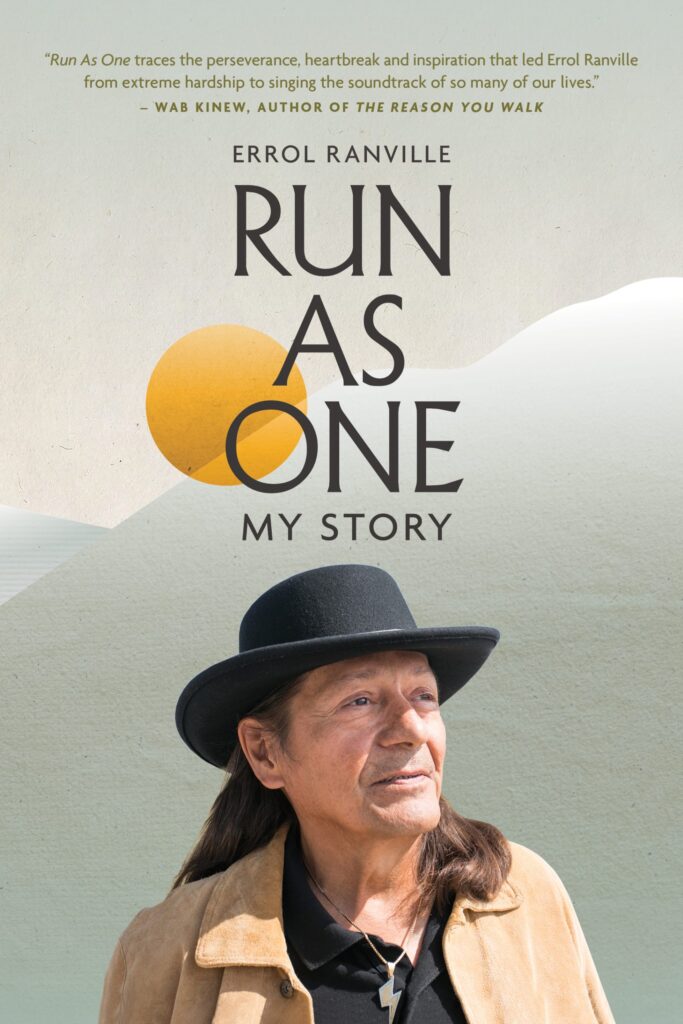 John Einarson
John Einarson
Local Music Spotlight
He’s one of Manitoba’s finest, most prolific singer/songwriters, with more than one hundred songs written and recorded over a dozen albums. He’s scored a half dozen national hit singles and been nominated for two Juno Awards. Yet not enough people know his name.
Errol Ranville has enjoyed a 40 plus-year career with no signs of slowing down. With a new album, Spirit Rising, in the works and a compelling autobiography Run As One: My Story, an at times heartbreaking story of triumph over adversity, published in 2021 by Great Plains Publications, it’s time to acquaint Manitobans with the man best-known as C-Weed.
Born and raised in rural Eddystone, Manitoba into a large Indigenous family, early on Errol saw music as an opportunity to escape a life of poverty and racism. He and his brothers Brian, Stirling, Wally, Don, Randy, and Errol all played music. “It was obvious that we had talent, potential and determination,” notes Errol. “What we didn’t have was the means to take those qualities further, out of the bush and the Indigenous house parties, to a wider audience.” In 1969, the family moved to Winnipeg to give their children the opportunity to pursue careers. “My parents made that sacrifice knowing that our dreams could never be fulfilled in Eddystone,” states Errol.
Gradually, C-Weed and The Weeds, based on Errol’s nickname, evolved into The C-Weed Band, with Errol on guitar and vocals, Wally on bass, Don on drums, plus renowned local guitarist Jimmy Flett, playing 6-hours a day, 6 days a week, for $65 a week each at the Brunswick Hotel on the Main Street strip. By the mid-1970s, with fiddler/guitarist Clint Dutiaume in the lineup, and older brother Brian directing their career from his job with the federal government in Ottawa, The C-Weed Band began playing reserves across Canada, opening up a circuit for later performers.
In 1981, the band’s recording of Robbie Robertson’s “Evangeline” topped the Canadian country music charts and they found themselves appearing on national television shows and performing at the biggest clubs and concert halls coast to coast. Further hits, including “Play Me My Favourite Song”, “Pickup Truck Cowboy”, “Bringing Home The Good Times” and “Magic In The Music”, all composed by Errol, became Top Ten hit singles. Over the years, The C-Weed Band has toured Europe, performed across the United States, and were invited to play at a major cultural festival in China. Along the way, the band became role models for Indigenous communities.

“The C-Weed band faced the kind of racism that Indigenous musicians as a whole had to deal with,” says David McLeod, general manager at NCI (Native Communications Incorporated) radio. Unless you’re Indigenous, you didn’t know how bad it was. It was like the deep south, club manager comes out, sees the band is Indigenous and says, ‘You guys can’t play here.’ That was the reality. It was kind of like Apartheid. But The C-Weed members, both individually and collectively, earned the respect of other non-Indigenous musicians and that went a long way in their eventual success.”
In 1990, Errol scored a hit single under his own name with the inspirational “I Wanna Fly”. “The song is about salvation,” he explains. “I wrote it during a tough time in life. That song made me come in contact with my spiritual self and it lifted me up. I was blessed to say exactly how I was feeling and I believed that maybe the song would do for others the same thing as it did for me.”
Ten years later, Errol wrote and recorded “Run As One’, a rallying cry for Indigenous peoples everywhere to unite. Inspired by Manitoba MLA Elijah Harper as well as the standoff in Oka, Quebec, the song has become an anthem in a time of truth and reconciliation. “To this day, ‘Run As One’ outsells all the C-Weed albums put together,” notes Errol, with justifiable pride. “It’s worldwide. It speaks to people in a way no other of my songs do. I never anticipated how much that song would resonate with a wider audience. It became a #1 song on radio for 17 weeks and was nominated for a Juno award.”
Errol and The C-Weed Band continue to be a major concert attraction across Canada and are already booked up for this coming summer.
Throughout his career, Errol Ranville has resisted pigeon-holing his music. “We never waved the Indian flag,” he insists. “Our music was just good country-rock music and we always wanted to be judged on that basis. We felt we could compete with non-Indigenous artists on an equal footing.” The recipient of several Indigenous music awards, Errol is also a member of the Manitoba Aboriginal Hall of Fame. But it’s time to recognize Errol and The C-Weed Band for their contributions to Manitoba music, not just Indigenous Manitoba music, with induction into The Order of Manitoba.
@ 2023 Pegasus Publications Inc.

